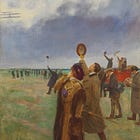When Does History Start?
When should you begin the systematic study of the past?
Welcome to Extra Muros, a blog that helps its readers acquire the skills, attitudes, knowledge, and habits that will enable them to provide themselves with a first-class liberal education. If you like what you see, please share Extra Muros with your friends.
History has a lot of history in it. That is, accounts that attempt to describe the lives and works of people of other eras invariably contain references to anterior events. In some cases, these pluperfect occurrences took place within living memory of the heroes of the tale. In others, they were done and dusted a long, long time before the story began.
This phenomenon provides self-directed students of history with a very good reason to engage the past in a manner that matches the flow of time. In doing so, however, it also raises the question of the best place to begin an adventure of this sort.
The creators of books, lecture series, and podcasts of the “Plato to NATO” persuasion often feel obliged to begin with matters that, strictly speaking, belong to disciplines beyond the border of Clio’s realm. That is to say, they trespass on the territory of the archeologist, describing civilizations that left much in the way of temples and tombs, but far too few of the sorts of texts that historians use to craft condign chronicles. Some go so far as to poach in the preserves of anthropologists, starting their grand chronologies with discussions of people (and, indeed, protopeople) who for whom life was, to borrow a line from the Ballad of Gilligan’s Island, “primitive as can be.”
Such prequels to history offer much grist for the mental mills of self-directed learners. Mentions of them, however, have rarely performed the sort of role that tales of “the glory that was Greece and the grandeur that was Rome” played in so many accounts of latter epochs. For example, a historian of the two millennia or so is much more likely to compare the hero of his tale to Julius Caesar than to the Hittite monarch Šuppiluliuma I.
With that in mind, I propose two possible starting points for a framework-building expedition. The easiest of these can be found at the moment when the Roman republic passes from legend into history. If you wish to be a bit more ambitious, you can start with the Greeks of the Classical Age. (Here, you may wish to start with the lecture series Introduction to Ancient Greek History.)1
Note: Readers who prefer reading with their eyes to reading with their ears will wonder why I have refrained from recommending books. I do this because the pages that host podcasts and recorded lectures of the better sort will provide references, transcripts, and suggestions for further reading. Few books, however, return the compliment.
For Further Reading:
I am, Gentle Readers, fully aware of the wicked works of the two sons and (most especially) the daughter-in-law of the late Professor Kagan. Thus, before you spill ink in the comments section on this subject, remember that worthy men may sire worthless children. (Marcus Aurelius, please call your answering service.)






To split pre-history from history I'd basically draw a line between civilization and before. I'd start history at various times, but essentially from the first Mesopotamian city states which also coincide with the first writing. That gives me around 3250BC in Sumer.
Perhaps the first "armies" in any sense too, and maybe the first taxes and dimplomacy we have recorded as well.
Brethren and Sisterthen (Sithersen? Sisterns?)
All of Kagan's Introduction to Greek History classes are at the Yale Online site for free. They are awesome. We lost a great man.
https://oyc.yale.edu/classics/clcv-205